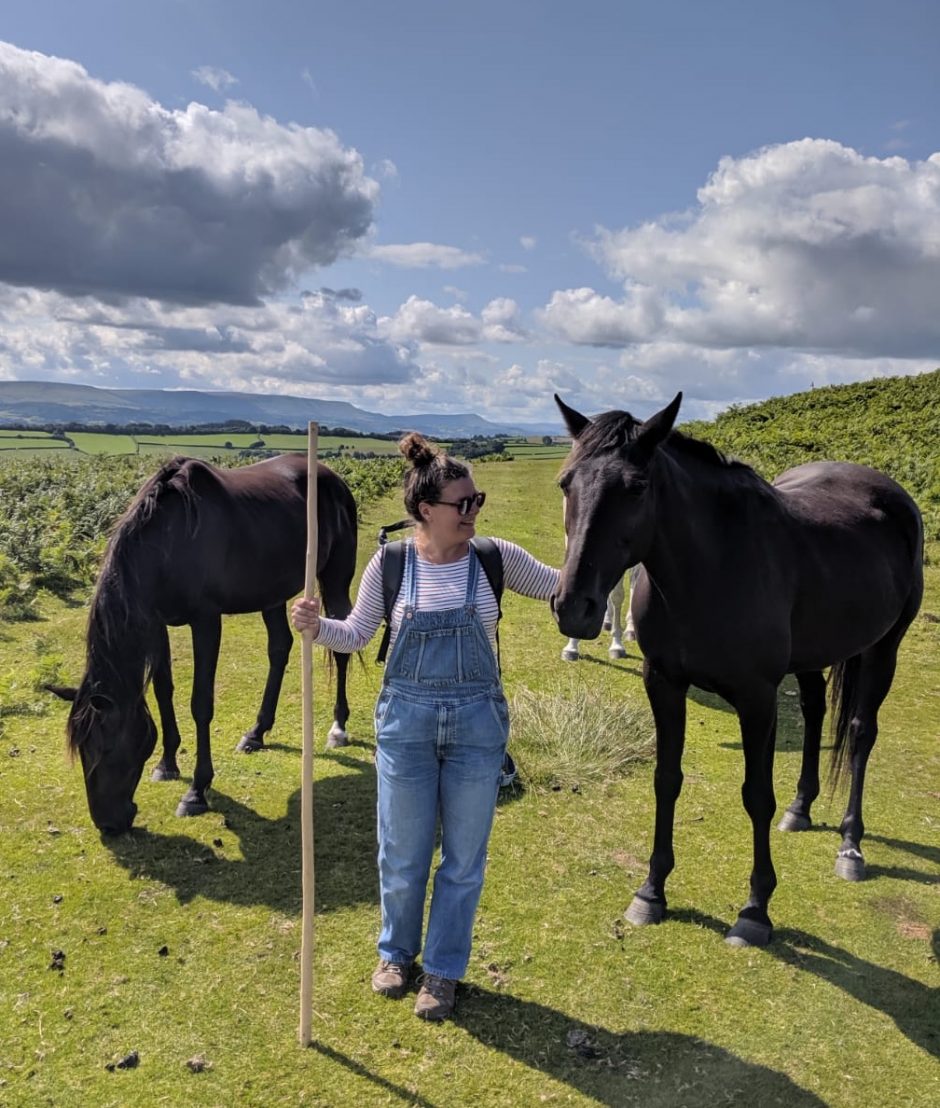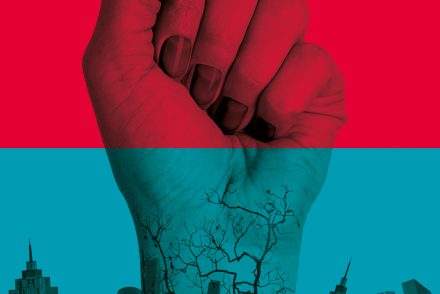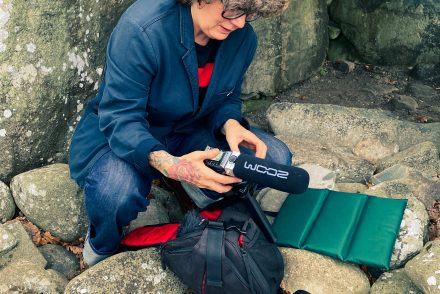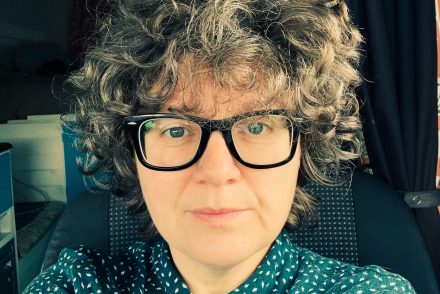Sophie McKeand
Do I contradict myself? Very well, then I contradict myself.
Walt Whitman
I am in love with swallows. They have become the mascot of our travels as we follow their migratory paths: north for summer, south for winter. Standing at the borderlands of Y Mers (The Welsh Marches in south Wales) with fellow collaborator Mark Daman-Thomas, we watch summer swallows swing determined arcs from farmhouse roofs out across ankle-high grasses to take flying insects on the wing then sling-shot a return into azure sky. Before moving into the van to embrace Slow Travel it’s a process I might have taken for granted, or maybe not even noticed, but now there is a feeling of recognition, of kinship that comes with watching these birds as I think on how they squat buildings with no land-ownership rights or rent book, asking no permission, leaving no trace except an occasional upside-down semi-cone nest glued to the wall in a barn with mud.

The swallows wear different shackles of course: lives inextricably chained to the seasons they must migrate thousands of miles south every winter to Africa before setting out on the epic return journey every spring. Our species was once nomadic in this way (if not travelling as far in one year), following blossoming food sources, foraging for berries and hunting, then 10,000 years ago the agricultural revolution happened. In Sapiens, Yuval Noah Harari believes that this (co-creation?) began when ‘a handful of plant species, including wheat, rice and potatoes … domesticated Homo sapiens, rather than vice versa.’ An inventive (and maybe contentious) approach that offers plants the agency they deserve, but however this has come about, we are now civilised.
We plant our monocrops; inseminate our animals by force; guard our territories with fences and guns which is leading us to fight for polar lands that are emerging from beneath melting ice caps; and all the time telling our children the ‘property ladder’ story which has come to be as big a myth for the average millennial as the pot of gold at the end of the rainbow.
Our species’ determination to mark ‘our’ territory does not only affect humans and domesticated animals held captive by endless fences. This need to demarcate lands and cultures is destroying the nomadic existence of countless beings whose lives, we have decided, do not hold the same value as our own. We have embraced and internalised this entitled sense of superiority to the point where we now net trees and hedgerows and shopping centre carparks in order to prevent the lives of wild birds impinging on our increasingly myopic monoculture with their nests & droppings. I cannot articulate the outrageous hubris of this.
I stand at the borderlands of Y Mers holding the lessons learned from the early decades of a life mostly lived within the same 12 miles radius, along with the insights foraged during this new nomadic, travelling life. All of these thoughts crash through me like an Atlantic Ocean wave: I return to my love for this land in which I was born – I have walked Y Gogledd Cymru (north Wales) until she mossed over skin, until a deep connection formed in bones; her lakes still call me to swim with the voice of my ancestors: economic migrants who, over the centuries, moved from Ireland, Scotland, Liverpool, Manchester and across the UK, to eventually settle in Cymru’s north eastern border counties; who made this place home.
Walking the Cymraeg/English border of Y Mers I forage for inspiration and am gifted the same thoughts unearthed in recent months on the yellow-rattle-rock landscapes of Crete, in the tumbling blue glacial waterfalls of Slovenia, or with the vast forests of Portuguese eucalyptus trees. There are thoughts I am afraid to articulate, but still, over and over I return to them: the land does not belong to us, we belong to the land and it is time to give up our attachment to owning and parcelling her out. It is time to unravel our cultures’ roots from the land and re-root them into our communities. In all honesty, it’s horribly difficult to write this. I feel out of synch here with my Cymraeg countryfolk whose national anthem, Mae Hen Wlad fy Nhadau (Land of my Fathers), tightly weaves the Cymraeg language and culture into the landscape:
Chorus:
Gwlad, Gwlad, pleidiol wyf i’m gwlad,
Tra môr yn fur i’r bur hoff bau,
O bydded i’r heniaith barhau.
Chorus:
Land! Land! I am true to my land!
As long as the sea serves as a wall
For this pure, dear land
May the language endure for ever.
At the recent march for Cymraeg independence in Caernarfon this summer.
Our fellow Celts over the Irish Sea have the proverb (attributed to Irish nationalist and poet Pádraig Pearse): Tír gan teanga, tír gan anam / A country without a language is a country without a soul. I agree that the language is inextricably tied to the identity of a group of people, no matter how large or small, but to then sink this like concrete fenceposts into a specific piece of land?
Maybe this outlook served us well in the past. But maybe in these changing times we need to embrace a new way of being in the world. The earth’s myriad and diverse cultures are rich and vibrant when allowed to flow freely across landscapes like rivers or murmurations of starlings. Cultures that travel together remain closely knit by experiences. Languages migrate easily anywhere; they are the jewel of a community held safe in the heart of every person who speaks in that priceless mamiaith (mothertongue) which is why we still have such strong links with Patagonia, half a world away from Cymru.
All languages and cultures are gifted to us by the land, by mother earth, and each community translates that into their unique ways of being, but the poetic, metaphorical source remains universal, infinite, accessible to all. As Clarissa Pinkola Estés tells us in her wonderful talks, Theatre of the Imagination, ‘What do you think the mother tongue is that unites all of us if it’s not symbolic language – the language of dreams and of imagination.’ Cymru is a nation of poets, but this poetic imagination thrives in every culture and recognises this same source of inspiration in every other.
Around us the world is changing. Cultures are being erased as the necessary act of crossing borders because of war, famine and drought is being made impossible. In addition to this, the demographics within borders are shifting dramatically. This is the natural order of things. Even as we dream up ingenious and horrific new ways to prevent people migrating across the earth, we move, and will continue to do so.
I’ve observed the futile efforts of well-meaning conservationists as they plant old Christmas trees in the hope of preserving the sanddunes at Talacre, north Wales in the face of endless devouring tides, and I’ve visited the Dune du Pilat in the south of France, the tallest sanddune in Europe that, like a mobile mountain, is crawling slowly inland, devouring roads and houses with each new decade it grows. We cannot change the course of either and it is not for us to do so. Nature will move the sand as she sees fit.
Perhaps this (amongst myriad others) is a sign for us to let go of old patriarchal, controlling, bordered ways of seeing the world and instead embrace the vision of King Canute who set his throne by the sea shore and commanded the incoming tide to halt, to not wet his feet or robes. Ignoring his words, the tide sloshed merrily over the king’s feet and legs without any respect for his royal position. The king leapt backwards, saying: ‘let all men know how empty and worthless is the power of kings!’ Regardless of how this tale has been reinterpreted by history, in the original version, Canute understands the futility of trying to hold back the tides and uses this gesture to prove it. The story goes on to praise the power of god as the greatest above kings, but let’s be clear, it is Mother Nature who birthed the tides, of water (and people), and we can change her no more than Canute. At least he had the wisdom to recognise this.
Let all people know how empty and worthless is the power of Sapiens.
I work in two timezones: the immediate and the distant. In dreams these are two warring birds: one, the fierce nationalist red of Cymru – a proud animal fighting centuries of oppression; the other is the universal white bird of peace who plucks relentlessly at the fire-feathers of Cymru’s heart. Perhaps in past stories such as that of Llud and Llefelys (in the Mabinogion) these two birds may have been the two dragons of native Britons and invading Saxons, but symbols change, as do we.
I love both birds equally. Even as I accept they are polar opposites, I know I cannot live without either. I wonder if perhaps they are Yin & Yang. One unable to exist without the other: at the epi-centre of red is a white dot, and vice-versa; the red bird symbolising community and family; the white, freedom of movement and international peace – two birds continuing to manifest as separate entities bound inextricably and eternally together symbolising the symbiotic way in which humanity might truly flourish.
As part of this collaboration on the Y Mers project, Mark and I foraged for Awen (inspiration) along y ffîn (the border/edge). We immersed in the beautiful landscape of the border – a line drawn on a map that cannot be seen with the naked eye – and also discussed the lives of Mark’s ancestors, farmers whose lives are inextricably tied to the land, who easily have the minimum requirement of four bodies, four generations of ancestors buried in one place to signal their belonging. From this process and these interactions, poetry and sounds have begun to grow organically and I’m looking forward to seeing how this unfolds.

But exploring these issues makes it increasingly difficult to ignore the fact that the world is changing. The climate is heating. People are fleeing human-accelerated natural disaster and war. Despots in the Whitehouse are building walls and fuelling racist hatred and that is being mirrored by Machiavellian politicians here in the UK. Yes Cymru needs autonomy away from English political jerrymandering, but we must then take that forward, not retreat into the past, because there is no objective history. Trump understands the intangible draw of a mythical past with his obtuse MAGA statements (which America are they returning to exactly?). All we truly have is hanes: a Cymraeg word that means both history and story. A word that teaches us the two sides of this one coin cannot be separated. If my stories are not your stories are they worth less? And if our culture centres around the stories we tell ourselves, we must hold ourselves accountable for the ways in which these stories shape our worldview.
Every day the earth recreates herself anew so that we might do the same, so that at any time we might step out of the shadows of the old castle ruins of ‘us and them’, of hatred and blame; my English voice, or your neighbour’s Polish voice, or the woman down the street speaking Portuguese or Pakistani or Nigerian, do not make Cymraeg any less important. It is not one piece of land that keeps a language strong, but the landscapes cultivated in the minds and hearts of each community who speak that language.
Perhaps if we can begin to erase the borders in our lands & minds and re-embrace all people and all the animals who share this world with us, we might begin to consciously and radically co-create new stories that allow us, as one inter-species-community, to reimagine a return to the heart of the wilderness.
Many of these themes are explored in the novel I’m currently writing, The Madness of Sara Mansfield. If this piece resonates with you then please also consider supporting my work through Patreon.









No Comments